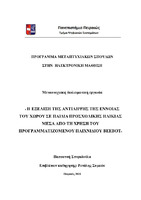Η εξέλιξη της αντίληψης της έννοιας του χώρου σε παιδιά προσχολικής ηλικίας μέσα από τη χρήση του προγραμματιζόμενου παιχνιδιού Beebot

View/
Keywords
Διδακτική παρέμβαση ; Προσχολική ηλικία ; Έννοιες του χώρου ; Προσανατολισμός ; Πλοήγηση ; Χάρτες ; Προγραμματιζόμενο παιχνίδι BeebotAbstract
This dissertation concerns the design, implementation and evaluation of teaching exercise using the programmable Beebot game. This educational exercise was applied to preschool children (5-6 years old) in order to develop their perception of the concepts of spatial awareness. The goals we set during the exercise were based on the goals determined by the Revised Curriculum (2019) as well as the Interdisciplinary Unified Framework of Study Programs for Kindergarten schooling.
In particular, the exercise involved six six-year-olds who were divided into two groups of three. There children were assessed at the beginning of the programme with a pre-test to assess their initial knowledge and level in relation to the spatial concepts “forwards”, “backwards”, “left” and “right”. In addition, orientation, navigation and map usage skills were assessed. The children then completed a five- day program of teaching activities aimed at improving the above knowledge and skills at the end of exercise, a period of one week was given and then a final evaluation was performed using a post-test. The pre- and post- tests were compared to collect data on whether the initial goals we set were achieved.
The results we obtained from the evaluation showed that children are able to perceive elements such as the position of objects in relation to a fixed reference system. The children also showed a marked improvement in the understanding and use of spatial concepts. A corresponding improvement was observed in the process of navigating themselves or an object om a reference system.


